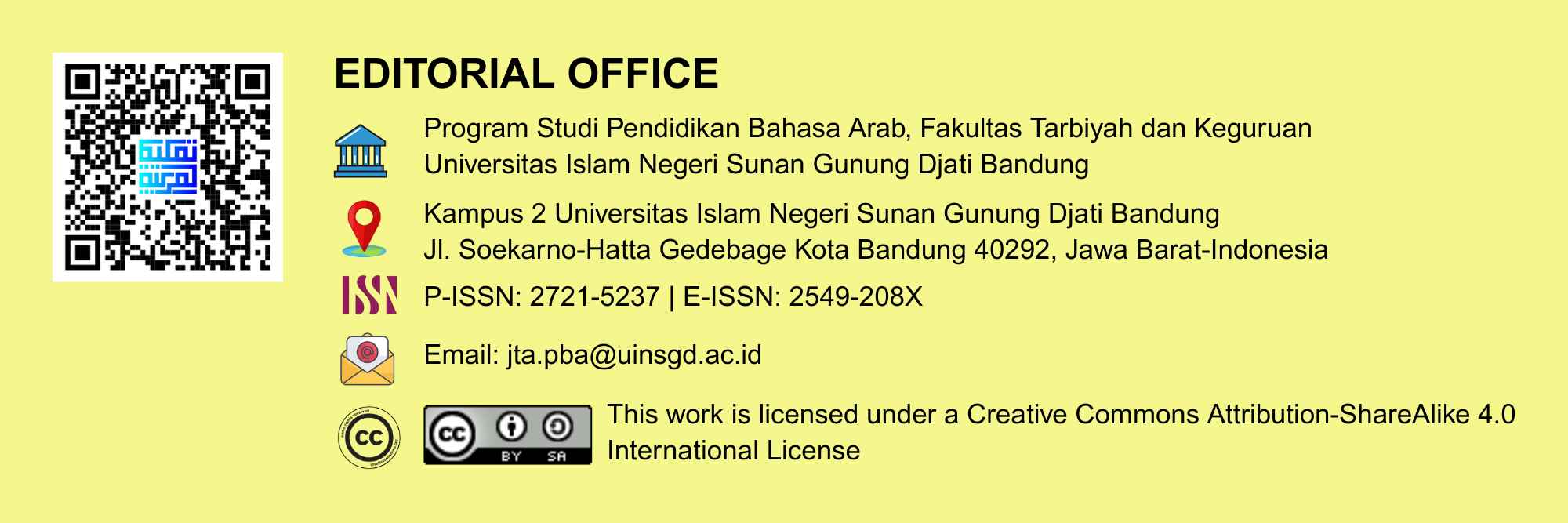Tanmiyah Al-MahÄrat Al-Lughawiyyah Li ThullÄb Kuliyyah Al-‘UlÅ«m Wa Al-TiknulÅ«jiya Min KhilÄl Al-Ta’lÄ«m FÄ« Al-HawÄi Al-Thalaq
DOI:
https://doi.org/10.15575/jpba.v5i2.14278Abstract
References
الدكتور على Ø£Øمد مدكور، الدكتور رشدي Ø£Øمد طعيمة، Ùˆ الدكتورة إيمان Ø£Øمد هريدي، 2010ØŒ المراجع ÙÙŠ مناهج تعليم اللغة العربية للناطقين بلغات أخرى، القاهرة: دار الÙكر العربي.
Abdul Majid, S. 1981. Ta’limu al-Lughah al-Hayyah wa Ta’limuha. Maktabah Lubnan.
Agustinus Susanta. 2010. Outbound Profesional. Yogyakarta: ANDI
Ancok Djamaludin. 2000. Outbound Management Training. Yogjakarta: UII Press
Arsyad, Azhar. 1999. Bahasa Arab dan Metode Pengajarannya. Yogyakarta: Pustaka Pelajar.
Asrori, Imam, 2009. Aneka Permainan, Penyegar Pembelajaran Bahasa Arab. Surabaya: Hilal Pustaka.
Badiatul Muchlisin Asti. 2009. Fun Outbound-Merancang Kegiatan Outbound Yang Efektif. Yogyakarta: Diva Press.
Effendi, Ahmad Fuad. 2009. Metodologi Pengajaran Bahasa Arab. Malang: Misykat.
Handoko, M. dan Riyanto, T.. 2006. Seratus Permainan Penyegar Pertemuan. Yogyakarta : Kanisius.
Hidayat, Z.A. dan Tatang, S.M. 1980. Permainan, Simulasi, Main Peran dalam Pengajaran Bahasa. Jakarta : P3G Depdikbud.
Jurnal COMM-EDU, Vol.1 No.1 Januari 2018, Hana Yunaida, Dkk, Outbound Berbasis Karakter Sebagai Media Pembelajaran Anak Usia Dini.
Jurnal Imla, Journal of Arabic Studies 2 (2), 2017, 156-162, Muhammad Luqman Hakim, Pemanfaatan Media Pembelajaran Game Interaktif dalam Pembelajaran Kosakata Bahasa Arab.
Jurnal Pemikiran Alternatif Pendidikan, Insania Vol.11 No.2 Jan-Apr 2006, 164-175, Subur, Pendekatan Dan Strategi Pembelajaran Bahasa Arab.
Marjohan. 2009. School Healing Menyembuhkan Problem Sekolah. Yogyakarta: Pustaka Insan Madani.
Syaiful Sagala. 2006. Konsep dan Makna Pembelajaran (Untuk Membantu Memecahkan Problematika Belajar dan Mengajar). Bandung: Alfabeta.
Tedjasaputra, Mayke S. 2001. Bermain, Mainan, dan Permainan. Jakarta: Grasindo.
Downloads
Published
How to Cite
Issue
Section
Citation Check
License
Authors who publish in Ta'lim al-'Arabiyyah: Jurnal Pendidikan Bahasa Arab dan Kebahasaaraban agree to the following terms:
- Authors retain copyright and grant the journal right of first publication with the work simultaneously licensed under a Creative Commons Attribution-ShareAlike 4.0 International (CC BY-SA 4.0) License that allows others to share the work with an acknowledgment of the work's authorship and initial publication in this journal.
- Authors are able to enter into separate, additional contractual arrangements for the non-exclusive distribution of the journal's published version of the work (e.g., post it to an institutional repository or publish it in a book), with an acknowledgment of its initial publication in this journal.
- Authors are permitted and encouraged to post their work online (e.g., in institutional repositories or on their website) prior to and during the submission process, as it can lead to productive exchanges, as well as earlier and greater citation of published work (See The Effect of Open Access).
![]()
Ta'lim al-'Arabiyyah: Jurnal Pendidikan Bahasa Arab dan Kebahasaaraban is licensed under a Creative Commons Attribution-ShareAlike 4.0 International License.
Based on a work at https://journal.uinsgd.ac.id/index.php/Talim








